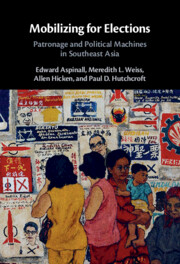Book contents
- Mobilizing for Elections
- Mobilizing for Elections
- Copyright page
- Contents
- Figures
- Tables
- Acknowledgments
- Terms and Acronyms
- 1 Patronage and Political Machines in Southeast Asia
- 2 Historical and Institutional Foundations
- 3 Mobilization Networks and Patterns of Patronage
- 4 Targeting Individuals: Don’t You Forget about Me
- 5 Targeting Groups
- 6 Hijacked Programs
- 7 Patronage and Identity
- 8 Subnational Variation
- 9 Conclusion
- Book part
- Bibliography
- Index
8 - Subnational Variation
Violence, Hierarchy, and Islands of Exception
Published online by Cambridge University Press: 04 August 2022
- Mobilizing for Elections
- Mobilizing for Elections
- Copyright page
- Contents
- Figures
- Tables
- Acknowledgments
- Terms and Acronyms
- 1 Patronage and Political Machines in Southeast Asia
- 2 Historical and Institutional Foundations
- 3 Mobilization Networks and Patterns of Patronage
- 4 Targeting Individuals: Don’t You Forget about Me
- 5 Targeting Groups
- 6 Hijacked Programs
- 7 Patronage and Identity
- 8 Subnational Variation
- 9 Conclusion
- Book part
- Bibliography
- Index
Summary
This chapter analyses variation in patronage politics at the subnational level in Indonesia, Malaysia, and the Philippines. Variation is apparent at two extremes: locales where politicians rely more intensely on patronage, often combining it with coercion; and “islands of exception,” generally urban areas, where programmatic appeals supplement or begin to supplant patronage. Explaining this variation, the chapter focuses on three variables: concentration of control over economic resources, levels of capacity of local state institutions, and relative autonomy and egalitarianism of local social networks. The mix of these three factors can provide politicians and citizens with options to escape the cycle of patronage politics, or may deepen citizens’ dependence on patronage and vulnerability to predatory politicians. These variables help explain subnational variation, including intense patronage relative to the rest of the country (e.g., in East Malaysia and Indonesian Papua), high coercion (e.g., in the Philippines’ Mindanao), and urban reform movements that push toward programmatic politics (e.g., in Penang in Malaysia, Surabaya in Indonesia, and Naga City in the Philippines).
Keywords
- Type
- Chapter
- Information
- Mobilizing for ElectionsPatronage and Political Machines in Southeast Asia, pp. 204 - 234Publisher: Cambridge University PressPrint publication year: 2022



